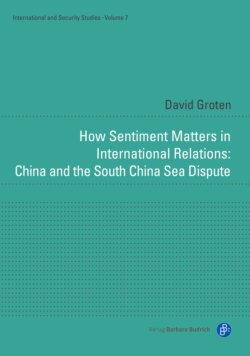Читать книгу How Sentiment Matters in International Relations: China and the South China Sea Dispute - David Groten - Страница 6
На сайте Литреса книга снята с продажи.
Table of Contents
ОглавлениеList of Tables
List of Figures
List of Abbreviations
Introduction
1. Research Interest and Relevance
2. Analytical and Theoretical Framework
2.1 A Conceptualization of Respect
2.1.1 Respect: Definitions, Related Concepts and Implications
2.1.2 Face (Work) and its General Role in China
2.2 The Hypotheses
2.2.1 Hypothesis I: ‘China’s self-ascribed status and identity conceptions were subject to change between 2007 and 2016’ …. 43
2.2.2 Hypothesis II: ‘Chinese disrespect experiences in the context of the SCS dispute are severe and have been increasing over time’
2.2.3 Hypothesis III: ‘A causal correlation between (dis)respect experiences and the type of policy recommendations and preferences advocated by FPTT scholars is plausible’
2.2.4 The Hypotheses: Summary
2.3 Operationalization of Respect and Disrespect
2.3.1 Reference Points and Respect Indicators
2.3.2 Literal Usage
2.3.3 References to Status and Social Importance
2.3.4 References to Rights
2.3.5 References to Dominant National Identity Narratives
2.3.6 Emotional Critique
2.3.7 Reliance on Minor Issues
2.4 Think Tanks as Research Subjects
2.4.1 Chinese FPTTs: Characteristics
2.5 Summary Analytical and Theoretical Chapter
3. The South China Sea Dispute
3.1 Historical Background and Sources of Conflict
3.2 Official Position and Claims by the PRC
3.3 Official Position and Claims by the Philippines
3.4 Official Position by the U.S.
3.5 Official Position by the ASEAN
4. The Role of (Dis)Respect in FPTT Discourses on External Stakeholders’ SCS Conduct
4.1 Hypothesis I: ‘China’s self-ascribed status and identity conceptions were subject to change between 2007 and 2016’
4.1.1 Identity Conceptions
4.1.2 Shift in Identity Conceptions
4.1.3 Status Conceptions
4.1.4 Shift in Status Conceptions
4.1.5 Summary Hypothesis I
4.2 Hypothesis II: ‘Chinese disrespect experiences in the context of the SCS dispute are severe and have been increasing over time’ (sub-case I: perception of U.S. conduct)
4.2.1 General Perception of Sino-U.S. Relations
4.2.2 General Perception of the U.S. Role in Southeast Asia
4.2.3 General Assessment of the ‘Return to Asia’
4.2.4 General Perception of U.S. Conduct in the South China Sea…. 120
4.2.5 Manifestations of (Dis)Respect in Discourses on U.S. Conduct (Criterion A1)
4.2.6 Summary Hypothesis II: Sub-Case I
4.3 Hypothesis II: ‘Chinese disrespect experiences in the context of the SCS dispute are severe and have been increasing over time’ (sub-case II: perception of Philippine conduct)
4.3.1 U.S.-Philippine Relations
4.3.2 Sino-Philippine Relations
4.3.3 Outlook: Sino-Philippine Relations under Duterte
4.3.4 Manifestations of (Dis)Respect in Discourses on Philippine Conduct (Criterion A2)
4.4 Hypothesis III: ‘A causal correlation between (dis)respect experiences and the type of policy recommendations/preferences advocated by FPTT scholars is plausible’
4.4.1 Main Objective I: Re-establishment of Respect & Self-worth
4.4.2 Main Objective II: Education of the Offender
4.4.3 Recommendations/Preferences in Response to External Conduct (Criterion C)
4.4.4 Responsibility of the Offender (Criterion B)
4.4.5 Objectives of Retaliation (Criterion D)
4.4.6 Plausibility of Causal Mechanism
4.4.7 Limitations
4.5 Summary of the Core Findings
5. Implications & Policy Recommendations
5.1 Theoretical Implications
5.2 Empirical Implications & Country-Specific Recommendations
5.2.1 Recommendations to the PRC
5.2.2 Recommendations to the Philippines
5.2.3 Recommendations to the United States
5.3 General Recommendations and Outlook
6. Conclusion
7. Appendix
7.1 The Category System
8. Bibliography
8.1 Secondary Sources
8.2 Primary and Government Sources
8.3 Think Tank Sources
